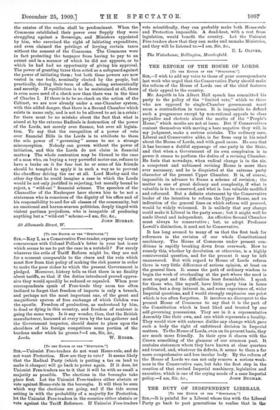THE REFORM OF THE HOUSE OF LORDS.
[To THE EDITOR OF THE "SPECTATOR; 'l SIR,—I wish to add my voice to those of your correspondents last week who urged that the Conservative Party should make the reform of the House of Lords one of the chief features of their appeal to the country.
Mr. Asquith in his Albert. Hall speech has committed his party to the policy of the " limited veto," which to those who are opposed to single-Chamber government must seem a contradiction in terms. It is impossible to defend such a programme except by non-rational appeals to class prejudice and rhetoric about the merits of the "People's House," which merits are not at issue. But if Conservatives content themselves with moving a bare negative they will, in my judgment, make a serious mistake. The ordinary man, Liberal and Conservative alike, is far from easy in his mind about the House of Lords, and with good cause. He sees that it has become a dutiful appanage of one party in the State, and that when a Government of its own complexion is in power it ceases to perform the duties of a revising Chamber. He feels that nowadays, when radical change is in the air, a competent and unbiassed revising House is more than ever necessary, and he is disquieted at the extreme party character of the present Upper Chamber. It is, of course, impossible in advance to frame a scheme of revision ; the matter is one of great delicacy and complexity, if what is valuable is to be conserved, and what is less valuable modified and reformed. But a definite statement by the Conservative leader of the intention to reform the Upper House, and an indication of the general lines on which reform will proceed, would he widely welcomed. It is unlikely that any change could make it Liberal in the party sense ; but it might well be made liberal and independent. An effective Second Chamber must always be conservative ; but, to adopt Professor Lowell's distinction, it need not be Conservative.
It has long seemed to many of us that the first task for reformers is the revision of our whole Constitutional machinery. The House of Commons under present con- ditions is rapidly breaking down from overwork. How to remedy this, whether by devolution or otherwise, is a highly controversial question, and for the present it may be left unanswered. But with regard to House of Lords reform there is very little difference of serious opinion, at least on the general lines. It seems the path of ordinary wisdom to begin the work of overhauling at the part where the need is most urgent and the difficulties least formidable. I speak for those who, like myself, have little party bias in home politics, but a deep interest in, and some experience of, wider Imperial questions, and I would strongly emphasise one poiig!-, which is too often forgotten. It involves no disrespect to the present House of Commons to say that it is the part of the Constitution which is least liked and trusted by our self-governing possessions. They see in it a representative Assembly like their own, and one which represents a locality. They would view with extreme dislike any change which gave such a body the right of unfettered decision in Imperial matters. To the House of Lords, even on its present basis, they are much more friendly. In their eyes it shares with the Crown something of the glamour of our common past. It contains statesmen whom they have known at close quarters and trusted, and, whatever its defects, it seems to them a far more comprehensive and less insular body. By the reform of the House of Lords we can not only remove a serious weak- ness in the Conservative case, but take the first step in the creation of that revised Imperial machinery, legislative and executive, which is one of the crying needs of a sane Imperial


































 Previous page
Previous page